Review: ‘Merrily We Roll Along’ on Broadway Is Almost-Perfect Sondheim
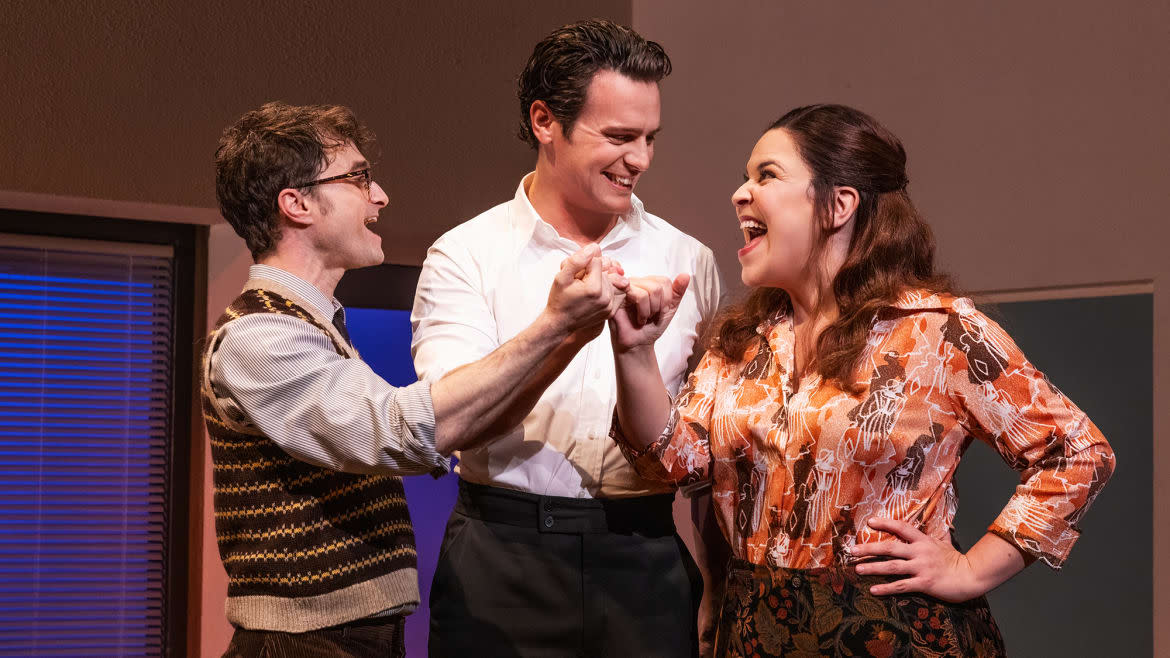
The most charming and delightful scene on Broadway right now is Daniel Radcliffe, Lindsay Mendez, and Jonathan Groff, as the core group of Charley, Mary, and Frank, singing “Old Friends” in Merrily We Roll Along (Hudson Theatre, booking to March 24, 2024).
The song is a teasing, typically ingenious Stephen Sondheim song about friendship and bonds—comic with a serious undertow, and the three lead actors playing three friends whose triangular relationship we chart in reverse perform it as a playful balletic joust—choreographed with a brilliant flow by Tim Jackson—that echoes the emotional waves of the song. Two gang up against one, one goes their own way, the group comes back together again, things shift, smiles and mischief reign, and then, collective push and pull finally done, they are finally united again with their signature us-against-the-world pinky-swear.
‘Merrily We Roll Along’: a Slice of Stunning Sondheim, Starring Daniel Radcliffe
The Tony-winning (for Carousel) Mendez, Radcliffe and Groff share a terrific collective chemistry that roots and animates the show. That does not mean the transfer of this Maria Friedman-directed show from New York Theatre Workshop is issue- or problem-free; oddly, it has sprouted unwelcome oddities in its upsizing. But it’s mainly still just as terrific it was in its luminous downtown incarnation. Even its newly spawned dents can’t shatter the whole, because the performances—not just the leads, the whole company—zing throughout. The lyrics and music are Sondheim at his most waspish and wise; days later, the songs are still buzzing in my mind, insisting on being hummed.
We follow the stories of Charley, Mary, and Frank backwards—friendships in tatters and broken at the outset in 1976, and then reassembled, right back to their sweet meeting on a New York City apartment building’s roof in October 1957, as Sputnik passes overhead in the night sky and they vouchsafe their union, as they set out to craft artistic careers.
So, we begin with an unhappy ending and end with a happy beginning, and that song of optimism, “Our Time.” Key songs, passages, and sentiments—“Not a Day Goes By”—recur throughout the show, like tolling bells.
The joy of the show is watching Radcliffe, Mendez, and Groff together, because they are quite visibly having the time of their performing lives. When they sing, towards the end, “Opening Doors,” as their careers stop and start in the late 1950’s—going to see shows, getting rejections, getting first gigs, or jobs in magazines—we are thrilled for them, not least because the New York personal and professional rollercoaster is a perennial all-too-familiar. The Broadway audience knows of what these characters sing.
Sondheim’s music and lyrics and George Furth’s book based on George S. Kaufman and Moss Hart’s original play are all performed with precision and deft comprehension. It is strange to think of it as the notorious flop it was when first on Broadway 40-plus years ago when you see it done so well. It followed the larger-scale, shimmering Into the Woods as another Sondheim jewel of 2022, and on Broadway in 2023 is running alongside Sondheim’s Here We Are, the show he was working on at the time of his death, at The Shed.
It’s taken 11 years for this production to make its way from London’s Menier Chocolate Factory via an Olivier Award-stop in the West End to Broadway, and the NYTW’s small stage last year made it even more of a treat—we could hear the voices and harmonies close-up (orchestrations by Jonathan Tunick and music design by Kai Harada). On Broadway, the space feels less thrilling, flatter even, than it did on its smaller downtown stage; and while the orchestra being walled off in its own apartment-like-structure at the top of the stage made ingenious sense in the space-constricted NYTW, it looks bizarre and needless on Broadway.
Still, Friedman and Jackson fill the stage with pods of movement and activity as loopy, tantalizing, and exacting as the lyrics, whether it be Mary’s drunken tirade and falls, bread rolls being used as missiles, or the wonderful company lurching as one towards the audience as the Blob, into which Sondheim and Furth distilled their version of the exhausting tastemakers (“Faabulous”) who govern the cultural conversation.
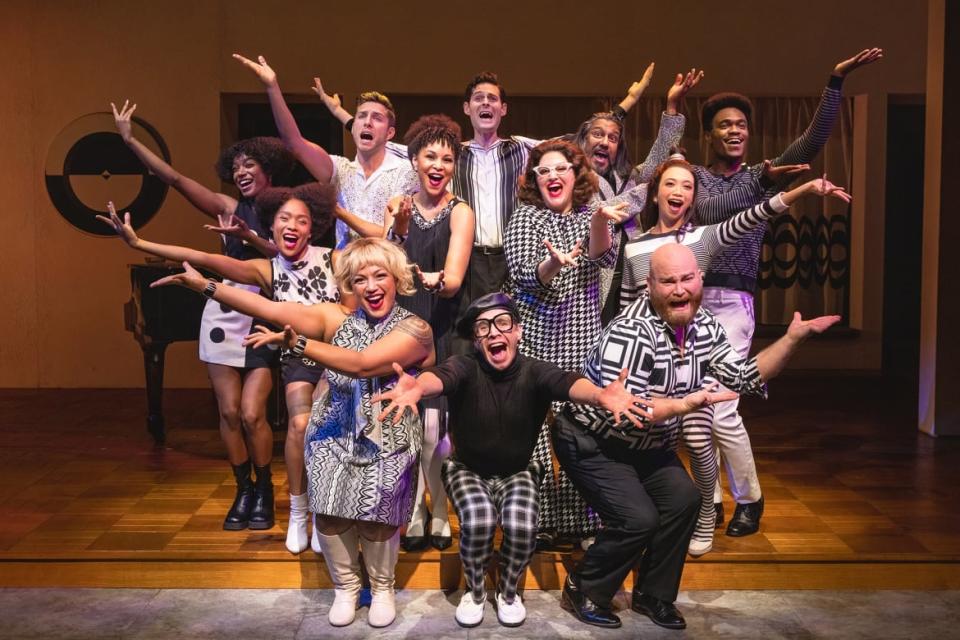
The "Merrily We Roll Along" company on Broadway perform as "the Blob."
Beyond the charm of the group, Mendez remains the standout star of the show as Mary Flynn, the drink-guzzling truth-teller of the group who loves Franklin hopelessly and who also wants desperately to keep the trio intact—despite Franklin’s wealth and airless Hollywood fame, and the ambitions and manipulations of his viperish wife Gussie Carnegie (Krystal Joy Brown) helping to drive them apart. But even Gussie has heartbreak to contend with, as Franklin has been cheating on her—and right in front of her and us. Mendez savors every one of her lines, and none lands harder than her mordant self-observation: “I say too much, and then I suffer.” Our audience laughed and sighed as one.
Since the downtown production, Radcliffe has grown thrillingly into his role at Charley Kringas, the book-writing half of the professional relationship he shares with songwriter Frank. Charley’s fierce denunciation of how vapid his old friend has become, “Franklin Shepard, Inc.,”—during a TV interview where his partner’s latest betrayal for fame emerges just before the camera turns on—the seething is quiet and with a curdled smile signaling that by now Charley expects nothing less from Frank. Radcliffe delivers it with such pistol-sharp vim the applause that follows stops the show. There is also a wonderful Easter egg of a joke right at the end of the show that hinges on the utterance of a name, and Radcliffe’s suddenly lovestruck face.
At NYTW, Groff crafted a career-shining role as Franklin, the rich, famous songwriter and film producer; on Broadway, some of the nuance of his Franklin has disappeared, and this is particularly evident in his final performance of “Our Time,” which he plays to the house, as if grandstanding a solo. Reg Rogers finds grounded depth and humor playing powerful producer Joe Josephson, Gussie’s first husband—making what could so easily be a cuckolded buffoon into someone who has both real vulnerability and insight, and is also very funny.
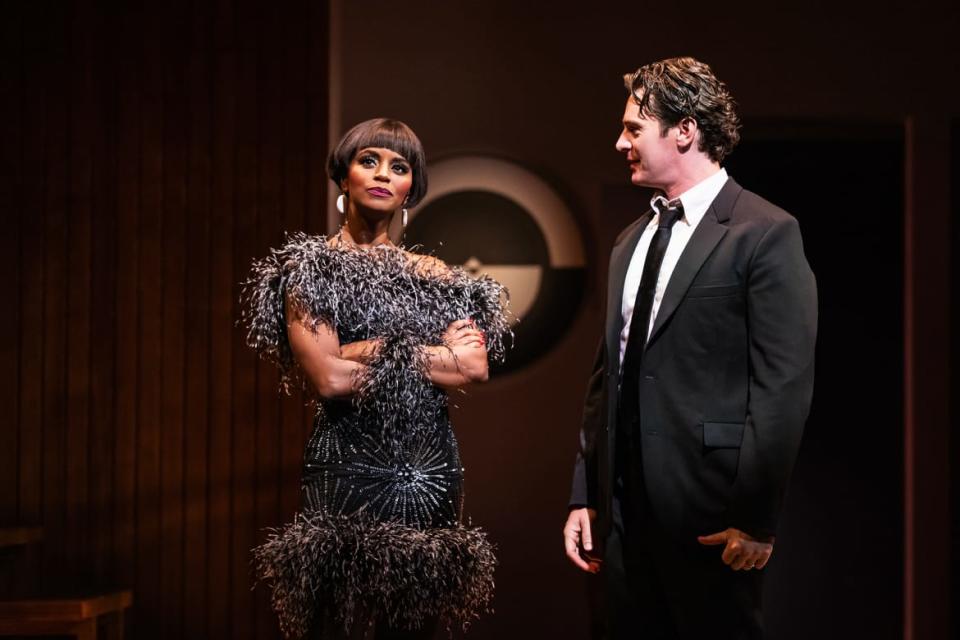
Krystal Joy Brown, left, and Jonathan Groff in "Merrily We Roll Along."
More general shortcomings of the book swing into view on Broadway far more than downtown. The switches back in time do not make a persuasive case about why this group of friends falls apart so easily. If they’re so bonded, Merrily never quite lays out what makes everything go bad.
Frank is a bit of an asshole after he becomes rich and famous, but not visibly an unbearable monster. Why are the other two so dependent on his friendship for their own emotional well-being? Why does Mary seem so invested in the men’s success, but they seem utterly uninvested in hers? She has a bestselling book, yet there is no mention of Franklin, as a producer, either making something of it himself, or shepherding her to a way to make it on screen. Why does he string her along, wittingly or unwittingly, knowing she has been in love with him all these years? The script glides around Mary’s unrequited love for Frank, but never commits to it as a proper storyline, particularly Franklin’s awareness (or not) of it.
We see snatches of a triangulated friendship, which impressively spans time, but we don’t see the friendships in action; we see it at moments of gestation, then crisis. We keep hearing and seeing portents of what went wrong, without ever seeing the grist of why things go so wrong. Would really good friends jettison what they share over what comes across as a few blow-ups, ego, jealousy, and scratchy pettiness? Would they never just speak and thrash out the bigger stuff? Would that not make for a better book?
Gussie’s villainy seems uncomfortably maximized as if it could be an explanation in and of itself. Brown is a wonderful performer, but this Merrily feels like it is putting way too much at Gussie’s door. The part of Frank Jr. (Brady Wagner at our performance; he shares the role with Max Rackenberg), Frank’s son, is played for a few too many cute awws.
If you have seen Merrily before, you know how moving it is—its smooth combination of gorgeous music, piercing lyrics, scythe-sharp humor, and rewind-constructed emotional highs and lows. It is good to know that, like us watching it, the cast reportedly cried a lot during rehearsals. As Mendez told the New York Times, “This show, it hits you in the gut every second.”
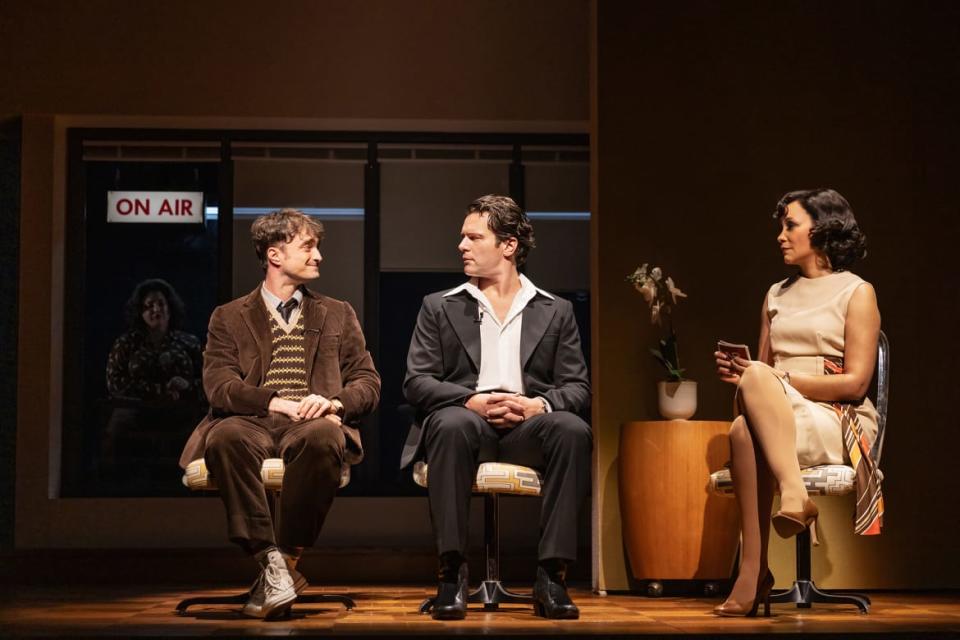
(l to r) Daniel Radcliffe, Jonathan Groff, and Natalie Wachen in "Merrily We Roll Along."
As performed so beautifully here, the songs don’t just pull at your heart-strings, they shred them: “Merrily We Roll Along,” “Not a Day Goes By,” and “Our Time” are all differently perfect distillations of regret, longing, desire, hopes, and dreams. “Opening Doors,” “Rich and Happy,” “It’s a Hit!” and “Good Thing Going” are more rollicking, charting upward life and career ascents. And utterly charming is the brilliant “Bobby and Jackie and Jack,” performed long before any success with Frank’s first wife Beth (Katie Rose Clarke, with too little to do)—a perfect, miniature satire of the tendrils of the Kennedy family.
Also on point: Soutra Gilmour’s scenic and costume design, the former making the most of a shell of an apartment, which seamlessly transforms from Los Angeles mansion to New York City penthouse and more. Amith Chandrashaker’s lighting is quietly stunning too: block colors echoing the extremely groovy and era-perfect fashions, from Beatnik to seventies glam and flares, and West Coast luxe.
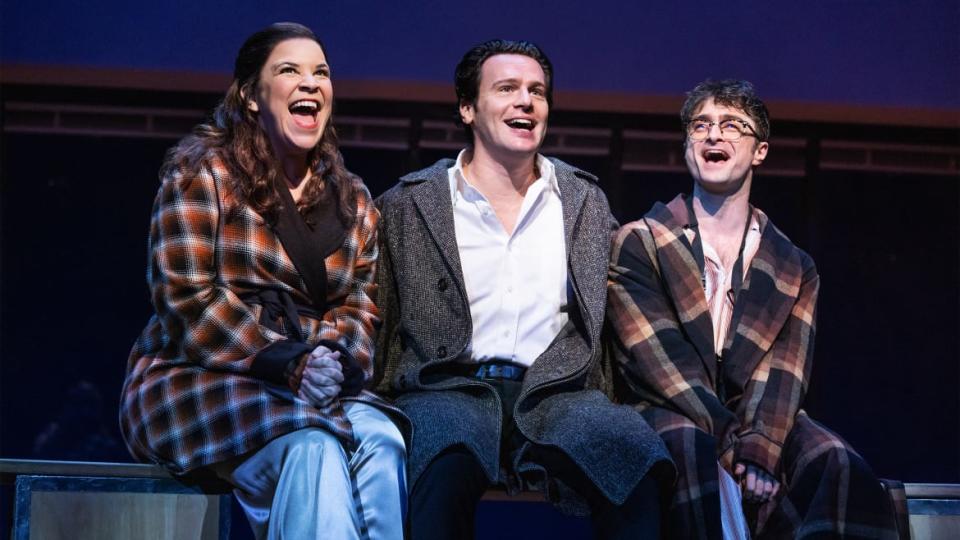
(l to r) Lindsay Mendez, Jonathan Groff, and Daniel Radcliffe in "Merrily We Roll Along."
Why, despite its many narrative shortcomings, does Merrily remain so moving? Well, we see on stage what we as humans tend to do—looking back to make sense of what went right or what went wrong. Yet we rarely see the trajectory as cleverly as Sondheim and Furth mount it. It is unsparing, yet its heart is open. That is why, as Mendez says, it is so lacerating to perform—and to watch. We see how art is the most important thing, and then becomes a wrestled-over and defiled commodity. We see friendship curdle, then bloom. In everything that goes bad we see good seeds and intent, accentuating the heartbreak of so much that is ultimately lost or broken.
In Mendez’s exquisite performance as Mary (truly, one of the stage performances of the year), we see not just a simple tale of unrequited love for Frank, but also the massed disappointments of the present day as contrasted to where we end the musical, where three people meet on a roof, their friendships, creativity and smarts sparking, ready to take on some kind of world out there. For a zesty few seconds, everything is new and possible—then, too soon, the moment is gone.
Get the Daily Beast's biggest scoops and scandals delivered right to your inbox. Sign up now.
Stay informed and gain unlimited access to the Daily Beast's unmatched reporting. Subscribe now.

